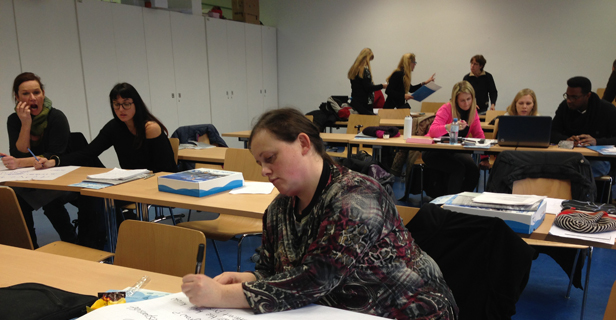
How do you explain sustainable development, climate change and hunger to high-school students? Which teaching resources can be used to show the importance of the work of the United Nations in class? How best to engage young people on the topics of the United Nations and encourage them to work for a better world?
For the first part of the seminar on 11 December 2014, the United Nations Information Service (UNIS) Vienna invited high-school English teachers from various Viennese schools to the Vienna International Centre to attend the workshop "United Nations and Sustainable Development for English lessons". After a guided tour, the 17 participating teachers were given a short introduction to the United Nations in general, sustainable development (including the Millennium Development Goals (MDG), climate change, poverty reduction and hunger.
UNIS staff presented a variety of different teaching materials developed by various UN organizations together with NGOs and civil society groups that could help teachers in explaining the United Nations to students of different age groups in the classroom.
On 16 December the second part of the workshop took place at the premises of the University of Teachers Education of Vienna, where the participants were invited to develop a lessons plan on a chosen UN-related topic. They worked in groups to developed interesting and diverse projects ready to be tried out in their schools.
The proposal for a lesson on poverty included brainstorming activities for pupils, short films about children living in poverty, playing an interactive game "Living on 1.25 dollars a day". Another lesson plan was developed to explain HIV/AIDS and its relation to poverty in Africa, asking the children to analyse the comic "Asmina's story", tell them real-life facts about poverty in African countries and also enrich their English vocabulary on the topic.
For a lesson plan on climate change, the teachers proposed showing the UN video "Why/Why not" where young people around the global call on world leader to act, followed by a discussion on how climate change relates to their everyday life. A simulation of the Lima UN climate change conference in class, could be used to encourage 14-years old students to draft a resolution to commit themselves to action against global warming, such as a "Can-free Monday" etc.
"The seminar was really informative and helpful," one participant said, sharing her impressions, "because engaging the young generation in civil participation and teaching human rights are the foundation for a sustainable and peaceful world".